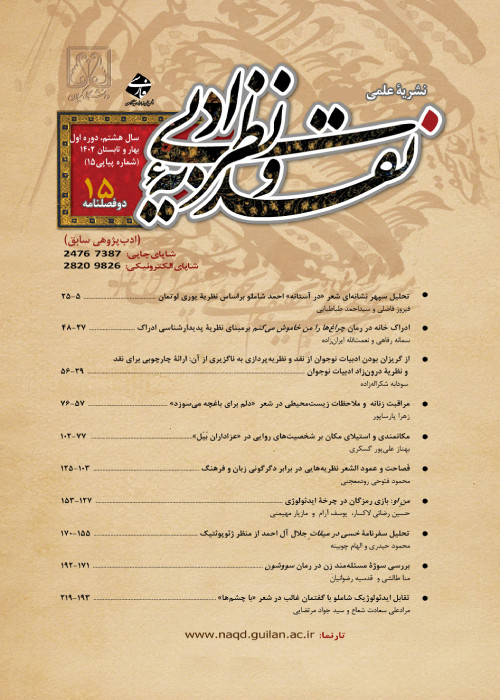A Discursive Analysis of the ‘Literary Revolution’ in Iran
Author(s):
Article Type:
Research/Original Article (دارای رتبه معتبر)
Abstract:
The ‘literary revolution’ planned by the Iranian constitutional intelligentsia and carried out by figures such as Ali Asghar Taleghani and Taghi Raf’at, rather than making new forms of poetry embracing the revolutionary content, proved itself to be an opposition to the classical tradition. The socio-political revolution had also influenced the Iranian literary field but did not lead to genuine literary theorization. The present article is based on Foucault’s archeology, but to expand the notion of the subject in his theory of discourse, the role of the subject will be further discussed through concepts such as the “logic of equivalence,” “discursive otherness,” the “subject position,” and the “pre-given subject,” as proposed by Laclau and Mouffe. The supporters of the traditional trend in poetry, like the poet-laureate Bahar and the poet-critic, Vahid Dastgerdi, attempting to canonize a neoclassical perspective, interpreted the literary revolution as an evolution or opposition against literary conventions. Employing Foucauldian archeology, the present paper tries to show that the notion of literary revolution goes back to the French Revolution and the later Ottoman and Russian practices, rooted in the zero degree of the emergence of literary revolution in Victor Hugo’s discourse which formed a romantic opposition to the classics. The genealogy of the concept shows how the literary traditionalists and conservatives used discursive strategies such as “destroying the meanings proposed by literary revolutionaries,” “focusing on literary figures from the past,” and “separating the political domain from the literary domain” to develop peripheral meanings and marginalize the definition of literary revolution proposed by the modernists. Extended Abstract1.IntroductionThinkers such as Fathali Akhoundzadeh and Aghakhan Kermani deemed fundamental changes in Iranian literature essential due to the absence of critical expression in classical Persian literature. Later, Aliasghar Taleghani and Taghi Raf’at, influenced by French literature, especially Victor Hugo, and the Russian Revolution, articulated the literary revolution discourse in Iran. Taleghani sought to bring about a literary revolution in Persian literature and criticized classical literature represented by poets such as Hafiz, Rumi, Sa’di, a movement that was resisted by more conservative literary figures such as Rashid Yasami, Abbas Eqbal Ashtiani, Saeed Nafisi, Taghizadeh and Malek-o-Shoa’ra Bahar. 2.Theoretical FrameworkThe present article draws on Foucault’s theory of discourse analysis, particularly his idea of genealogy. To further explain the status of the subject of Foucault’s theory, we have employed the concepts and strategies developed in Laclau and Mouffe’s discourse theory. 3.Methodology The present article employs the qualitative content analysis methodology. Foucault’s theory of discourse analysis has been used to study the ‘literary revolution’ supported by some important literary figures in Iran. 4.Discussion and AnalysisA careful study of reports by literary journals and associations in the final decades of the Qajar era can clarify some ambiguities in the literary revolution in Iran. The present study examines French, Ottoman and Russian influences on the ‘literary revolution’ in Iran and describes both revolutionary and conservative attitudes toward the literary revolution discourse. Our semiotic and genealogical study of the concept of literary revolution identified hegemonic signification employed by subjects in the articulation of discourses. 5.Conclusion Literary figures in Iran reacted differently to the ‘literary revolution’ in Iran. Rather than develop new forms of poetry that embraced the revolutionary content, the revolution was an opposition to Iranian classical poetry because it did not result in genuine literary theorization. The idea of a literary revolution draws heavily on French, Ottoman and Russian literary movements. The genealogy of this idea reveals that literary traditionalists and conservatives employed discursive strategies such as “destroying the meanings proposed by literary revolutionaries,” “focusing on literary figures from the past,” and “separating the political domain from the literary domain.” Advocates of the literary revolution, on the other hand, tried to focus on their central signifier, i.e., “revolutionary dissent.” Select BibliographyAdamiyat, F. 1349 [1970]. Andisheh-ha-ye Mirza Fathali Akhoundzadeh. Tehran: KharazamiAryanpour, Y. 1346 [1967]. “Tajadod-e Adabi.” Jahan-e Noe 4-5: 108-126.Bahar, M. T. 1393 [2014]. Bahar va Adab-e Farsi. M. Golbon (ed.). Tehran: Elmi va Farhangi.Foucault, M. 1387 [2008]. Dirinehshenasi-e Danesh. N. Sarkhosh and A. Jahandideh (trans.). Tehran: Nay.Foucault, M. 1977. “What is an Author?” In: Bouchard, D. F. (ed.). Language, Counter-memory, Practice. D. F. Bouchard and S. Simon (trans.). Ithaca: Cornell University Press. pp. 113-38. Hugo. V. 1834. Littérature et philosophie mêlées. Bruxelles: L. Hauman.Jørgensen, M. and Philips. L. 1389 [2010]. Nazaryeh va Ravesh dar Tahlil-e Gofteman. H. Jalili (trans.). Tehran: Nay.Rafa’at, T. 1297 [1918]. “Yek Osyan-e Adabi.” Tajadod 70: 25-34.Taleghani, A. A. 1296a [1917a]. “Maktab-e Sa’di.” Zaban-e Azad 6: 1-2.Taleghani, A. A. 1296b [1917b]. “Shagerd-e Maktab-e Sa’adi.” Zaban-e Azad 7: 1.Vahid Dastgerdi, H. 1299 [1920]. “Enqelab-e Adabi, Adib-e Enqelabi.” Armaghan 4: 109-113.
Keywords:
Language:
Persian
Published:
Literary Theory and Criticism, Volume:7 Issue: 1, 2022
Pages:
207 to 232
magiran.com/p2523252
دانلود و مطالعه متن این مقاله با یکی از روشهای زیر امکان پذیر است:
اشتراک شخصی
با عضویت و پرداخت آنلاین حق اشتراک یکساله به مبلغ 1,390,000ريال میتوانید 70 عنوان مطلب دانلود کنید!
اشتراک سازمانی
به کتابخانه دانشگاه یا محل کار خود پیشنهاد کنید تا اشتراک سازمانی این پایگاه را برای دسترسی نامحدود همه کاربران به متن مطالب تهیه نمایند!
توجه!
- حق عضویت دریافتی صرف حمایت از نشریات عضو و نگهداری، تکمیل و توسعه مگیران میشود.
- پرداخت حق اشتراک و دانلود مقالات اجازه بازنشر آن در سایر رسانههای چاپی و دیجیتال را به کاربر نمیدهد.
In order to view content subscription is required
Personal subscription
Subscribe magiran.com for 70 € euros via PayPal and download 70 articles during a year.
Organization subscription
Please contact us to subscribe your university or library for unlimited access!


